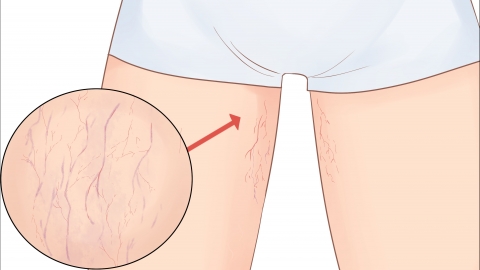What department should I visit for capillary dilation?
Generally, patients with capillary dilation can choose to visit the dermatology, cardiovascular medicine, endocrinology, respiratory medicine, or ophthalmology departments, depending on the location of symptoms and potential causes. Detailed analysis is as follows:

1. Dermatology
If capillary dilation appears on the face, neck, limbs, or other skin surfaces, presenting as red or purplish-red punctate or linear markings, it is recommended to visit the dermatology department first. Dermatologists will evaluate whether it is primary cutaneous capillary dilation through visual inspection and dermatoscopy.
2. Cardiovascular Medicine
If capillary dilation is accompanied by chest tightness, palpitations, lower limb swelling, or is suspected to be related to cardiovascular disease, consultation with the cardiovascular medicine department is necessary. Doctors will perform tests such as electrocardiogram and cardiac ultrasound to rule out structural heart abnormalities or vascular lesions. A targeted treatment plan will then be developed to prevent involvement of the circulatory system.
3. Endocrinology
If capillary dilation is accompanied by abnormal weight changes, palpitations, excessive sweating, dry skin, or other symptoms, it may be related to endocrine disorders such as hyperthyroidism or diabetes. In such cases, consultation with the endocrinology department is advised. Doctors will assess hormone levels and blood glucose to determine whether vascular abnormalities are caused by endocrine disorders. Treatment of the underlying condition can help alleviate symptoms of capillary dilation.
4. Respiratory Medicine
If capillary dilation is accompanied by persistent cough, hemoptysis, or dyspnea, it may be related to lung disease, and consultation with the respiratory medicine department is required. Doctors will perform chest CT scans and pulmonary function tests to identify pulmonary lesions and assess the extent of pulmonary vascular involvement, thus preventing severe complications caused by worsening lung disease.
5. Ophthalmology
If capillary dilation occurs around the eyes or is accompanied by eye redness, vision loss, or dry eyes, consultation with the ophthalmology department is necessary. Ophthalmologists will examine the ocular vasculature to determine if the dilation is caused by local inflammation, ocular surface injury, or a systemic disease affecting the eyes. Appropriate drug or physical therapies will then be used to protect ocular function.
In addition, patients with capillary dilation who experience unexplained bleeding should visit the hematology department for evaluation of coagulation dysfunction. In daily life, patients should avoid frequent friction on the affected areas, practice sun protection, reduce thermal stimulation, and seek timely medical attention for adjustment of treatment plans if symptoms worsen or spread.








